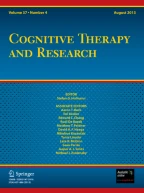Abstract
A 30-item questionnaire was devised to measure the frequency of occurrence of automatic negative thoughts (negative self-statements)associated with depression. Male and female undergraduates were asked to recall dysphoric experiences and to report associated cognitions. One hundred representative cognitions were selected and administered to a second sample, along with the MMPI D scale and the Beck Depression Inventory. Thirty items discriminating between criterion groups of psychometrically depressed and nondepressed subjects were identified. The resultant 30-item automatic thoughts questionnaire (ATQ-30)was cross-validated and found to significantly discriminate psychometrically depressed from nondepressed criterion groups. No differences were found between males and females on the measure. Factor analysis indicated a four-factor solution, with a large first factor reflecting Personal Maladjustment, a second factor indicative of Negative Self-Concept and Negative Expectations, and two lesser factors. The ATQ-30 may provide a means of testing basic theory relating cognitive content to behavioral and affective processes and assessing change in cognitions associated with experimental manipulation or psychotherapeutic intervention.
Similar content being viewed by others
References
Abramson, L. Y., Seligman, M. E. P., & Teasdale, J. D. Learned helplesness in humans: Critique and reformulation.Journal of Abnormal Psychology 1978,87 49–74.
Bandura, A. Self-efficacy: Toward a unifying theory of behavioral change.Psychological Review 1977,84 191–215.
Beck, A. T. Thinking and depression: I. Idiosyncratic content and cognitive distortions.Archives of General Psychiatry 1963,9 324–333.
Beck, A. T. Thinking and depression: II. Theory and therapy.Archives of General Psychiatry 1964,10 561–571.
Beck, A. T.Depression: Clinical, experimental, and theoretical aspects. New York: Hoeber, 1967.
Beck, A. T.Cognitive therapy and the emotional disorders. New York: International Universities Press, 1976.
Beck, A. T., Rush, A. J., Shaw, B. F., & Emery, G.Cognitive therapy of depression: A treatment manual. New York: Guilford Press, 1979.
Beck, A. T., Ward, C. H., Mendelson, M., Mock, J., & Erbaugh, J. An inventory for measuring depression.Archives of General Psychiatry 1961,4 561–571.
Bumberry, W., Oliver, J. M., & McClure, J. N. Validation of the Beck Inventory in a university population using psychiatric estimate as the criterion.Journal of Consulting and Clinical Psychology 1978,46 150–155.
Depue, R. A., & Monroe, S. M. The unipolar-bipolar distinction in the depressive disorders.Journal of Abnormal Psychology 1978,87 3–20.
Ellis, A. E.Reason and emotion in psychotherapy. New York: Lyle Stuart, 1962.
Ellis, A., & Grieger, R.Handbook of rational-emotive therapy. New York. Springer, 1977.
Goldfried, M. R., & Davison, G. C.Clinical behavior therapy. New York: Holt, Rinehart & Winston, 1976.
Goldfried, M. R., & Sobocinski, D. Effect of irrational beliefs on emotional arousal.Journal of Consulting and Clinical Psychology 1975,43 504–510.
Hathaway, S. R., & McKinley, J. C. The measurement of symptomatic depression with the Minnesota Multiphasic Personality Schedule.Psychological Bulletin 1940,37 425.
Hollon, S. D., & Beck, A. T. Cognitive therapy of depression. In P. C. Kendall & S. D. Hollon (Eds.),Cognitive-behavioral interventions: Theory, research, and procedures. New York: Academic Press, 1979.
Jones, R. G.A factored measure of Ellis' irrational belief system. Wichita, Kansas: Test Systems, 1968.
Kendall, P. C., & Hollon, S. D. (Eds.).Cognitive-behavioral interventions: Theory, research, and procedures. New York: Academic Press, 1979.
Kendall, P. C., & Hollon, S. D. Assessing self-referent speech: Methods in the measurement of self-statements. In P. C. Kendall and S. D. Hollon (Eds.),Assessment strategies for cognitive-behavioral intervention. New York: Academic Press, 1981.
Kendall, P. C., & Korgeski, G. P. Assessment and cognitive-behavioral interventions.Cognitive Therapy and Research 1979,3 1–21.
Kendall, P. C., Williams, L., Pechacek, T. F., Graham, L. E., Shesslak, C., & Herzoff, N. Cognitive-behavioral and patient education interventions in cardiac catheterization procedures: The Palo Alto medical psychology project.Journal of Consulting and Clinical Psychology 1979,47 49–58.
Kuder, G. F., & Richardson, M. W. The theory of estimation of test reliability.Psychometrika 1937,2 151–160.
Mahoney, M.Cognition and behavior modification. Cambridge, Massachusetts: Ballinger, 1974.
Mahoney, M. Reflections on the cognitive-learning trend in psychotherapy.American Psychologist 1977,32 5–13.
Meichenbaum, D.Cognitive-behavior modification. New York: Plenum, 1977.
Nelson, R. E. Irrational beliefs in depression.Journal of Consulting and Clinical Psychology 1977,45 1190–1191.
Rehm, L. P. Assessment of depression. In M. Hersen & A. Bellack (Eds.),Behavioral assessment: A practical handbook. New York: Pergamon Press, 1976.
Robins, E., & Guze, S. B. Classification of affective disorders: The primary-scondary, the endogenous-reactive, and the neurotic-psychotic concepts. In T. A. Williams, M. M. Katz, & J. A. Shields (Eds.),Recent advances in psychobiology of the depressive illnesses. Washington, D.C.: U.S. Government printing Office, 1972.
Rush, A. J., Beck, A. T., Kovacs, M., & Hollon, S. D. Comparative efficacy of cognitive therapy and pharmacotherapy in the treatment of depressed outpatients.Cognitive Therapy and Research 1977,1 17–37.
Schwartz, R. M., & Gottman, J. M. Toward a task analysis of assertive behavior.Journal of Consulting and Clinical Psychology 1976,44 910–920.
Shaw, B. F. Comparison of cognitive therapy and behavior therapy in the treatment of depresion.Journal of Consulting and Clinical Psychology 1977,45 543–551.
Spielberger, C. D., Gorsuch, R. L., & Lushene, R. E.Manual for the State-Trait Anxiety Inventory (Self-Evaluation Questionnaire). Palo Alto, California: Consulting Psychologists Press, 1970.
Taylor, F. G., & Marshall, W. L. Experimental analysis of a cognitive-behavioral therapy for depression.Cognitive Therapy and Research 1977,1 59–72.
Author information
Authors and Affiliations
Additional information
Preparation of this article was supported in part by two University of Minnesota Graduate School Grants in Aid of Research (492-0325-4909-02; 440-0160-4909-02) to the first and second authors, respectively. We wish to thank Auke Tellegen for his invaluable comments and suggestions, and Cliff Johnson for his reliable assistance.
An expanded version of this manuscript, complete with correlation matrix, is available from the authors.
Rights and permissions
About this article
Cite this article
Hollon, S.D., Kendall, P.C. Cognitive self-statements in depression: Development of an automatic thoughts questionnaire. Cogn Ther Res 4, 383–395 (1980). https://doi.org/10.1007/BF01178214
Issue Date:
DOI: https://doi.org/10.1007/BF01178214
